This week, I am trying to teach the younger students, the first graders (first grade in high school in Korea is 14/15 year olds) about conditional phrases like: "If I were a millionaire I would buy a new car." I had the girls in groups of about five and they had to come up with a list of five things that they would want to have if they were stranded on a deserted island. The variation in responses was tremendous and it was really interesting to see what they either viewed as important to have when stranded on a deserted island or what they simply could not live without. Some of the responses are as follows:
a pregnant pig (they said they would kill the pig and eat it AFTER it had its baby, very smart); a pencil (so they could study); Buzz, Super Junior, etc. (at least three or four teams requested to have their favorite Korean Pop bands and singers with them on the island.); bottle (when asked what they would do with the bottle they said they would put a note in it and ask for help; however they did not have pencil or paper on their list, so they said they would write on a piece of bark using ash from the fire.); MP3 Player (after the battery dies they could wear it as a necklace); mosquito repellant (I was suprised that only one group put that); airplane (very practical); TV(this is something that qualifies as something they don't think they can live without); underwears (Some groups put clothes, so I thought it was interesting that these girls only put "underwears", I guess instead of a "nudist colony", it will be an "underwears colony".); pet (they swore they would not eat this pet even if there was no other food left on the island.); diary (so that they can write it all down and when they return to civilization they can sell it as a novel and get rich; these girls were thinking ahead); pizza (interesing; at least they realize that the pizza guy doesn't deliver to deserted islands...); treeman (this group also had an axe listed; however, they would not use the axe themselves, oh no, they would want to have a treeman who would cut the trees and build them a house.); a boy (to play with, but when asked if they would marry him and have children there were little squeals released from mouths around the room...guess not.)
Tuesday, September 26, 2006
Saturday, September 23, 2006
Cutting the grass...
This weekend the weather was beautiful! The humidity dissapeared on Saturday and we were left with cool fall weather; it was a really nice break from the damp air that usually hangs around outside. Friday night I met up with my friend Jeehee, who is a really great woman that I've spent the past few Sundays with. Jeehee has been really nice to show me around, taking me to lunches, and to see some incredible things, like the photo gallery I went to last weekend. This morning, my co-teacher took me to cut the grass on his ancestors' graves. Traditionally women do not go, and I believe some families still abide by this rule, but I went and so did most of the women in Mr.Hyun's family. Almost all of his brothers and sisters were together for this day and some cousins. It was really interesting to see the dynamic of a big family together, because there is definitely a hierarchy. Most of the time the oldest brother at the gravesite would bark orders at everyone, while the younger brothers all worked to cut and clear the grass from the graves. In Korean there is no word for brother, just younger brother, older brother, or oldest sister, etc. Each child's role in the family is defined by the order in which they were born. Mr. Hyun, my co-teacher is the third eldest son, so he barked orders at the first gravesite where he was the eldest, but by the last grave his older brother was there, so he no longer bossed people around, because it was very clear whose job that was. In total there were 15 graves, but the team that we were working with only did a total of 5. We ate a brunch at about 10:30am together, which was delicious and I was back in Jeju City by 1pm.
Photos from my weekend 9/24/06
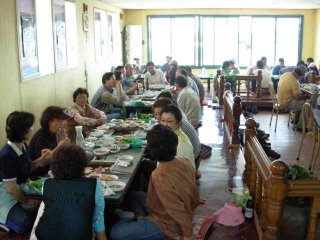
After we finished cutting the grass on all the graves; Mr.Hyun's family and I went out to eat at a restaurant in the nearby town of Pyeoson.
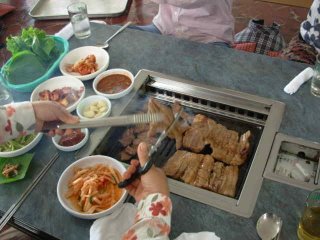
This is a Korean specialty called Kalbi, it cooks at your table and it is always served, like most Korean meals, with a bunch of side dishes.
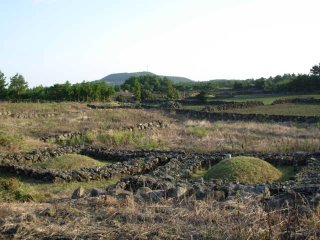
Here are two of the finished graves after the grass has been cut.
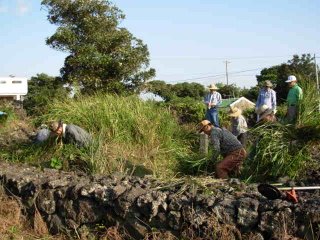
Everyone works together, one person with a gas powered hedge cutter, and the rest of us clear the grass away and use small machetes to hack the weeds and grass down.
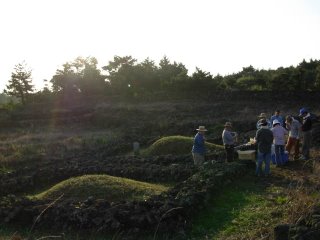
This morning my co-teacher Mr. Hyun picked me up at 5:00am to head for the east side of Jeju Island where his family is from. The road was full of cars headed out of the city to cut the grass on their ancestors traditional graves. Traditionally all the men in the family go once a year on this day, which is two Sundays before Chusok, Korea's Thanksgiving.
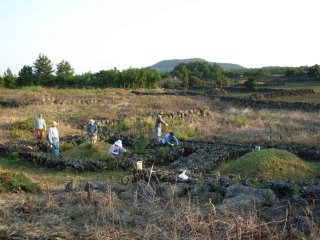
Mr. Hyun's family cuts about 15 graves, but everyone starts off in about four different teams and we moved from grave to grave cutting the grass in and around the burial plots of his ancestors. Eventually everyone ends at the same grave and once that one is cut, we all headed to a restaurant to eat together.
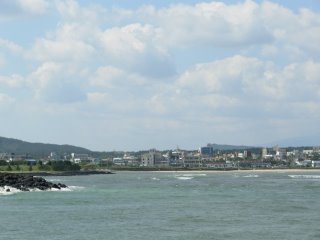
This is Pyeoson, which is the name of a small town on the east side of the island, where Mr. Hyun is from.
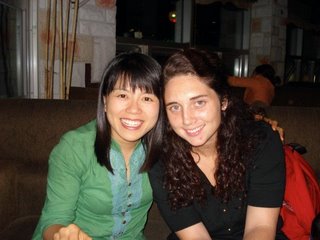
Friday night I met up with my friend Jeehee, a young teacher from my school. She is very very nice and I am sure that we are going to be great friends. Jeehee is actually 35 years old even though she looks about half that age.
Monday, September 18, 2006
The Language of Opportunity
Before I came to Korea, I didn't know what it would feel like to have a higher net worth simply due to the fact that I am able to speak my native language like a native. It's as if I am being made a huge deal of simply because I can walk or something; I mean, I've been speaking English for 25 years and noone ever commended me on it. Being a native English speaker qualifies me to do many things that fall outside of the bounds that Koreans set for other Korean teachers. I do not have to to be trained in teaching, take any sort of test, or even explain my language in technical terms; all I have to do is speak. It's an interesting phenomenon and many people might say, "Well, duh...that's why you went Korea;" however, the phenomenon I am describing would have been hard to prepare for. I guessed I imagined it would be more like being a "foreign" language teacher, which I am, only English seems to take precedence over Korean. There is almost a sort of desperation surrounding the acquisition of the English language, which has resulted in the trend of foreign English teachers coming to Korea in general (Korea is the highest paying Asian country for ESL teachers.) In the same way that Korean language presents itself to me, English is such a foreign beast for Koreans. The other night I attended an English Festival where there was a sort of Jeopardy competition being conducted with high school students as the contestants. The orator read off English definitions for words like FTA, Greenhouse Effect, and Nobel Peace Prize in English to which the students would respond by holding up a dry erase board with the answer written either in Korean OR English, it was optional. In fact most of the English festival was conducted in Korean, yet the performers performed monologues straight from the classics and there was a flawless production of a Korean version of the Sound of Music! While Jeopardy was going on, the audience tried to guess the answers, and it was very interesting to watch, because to them, this was English, a sort of code that they couldn't quite crack. In many ways it seems like part of the reason that English is so hard for Koreans is that the language itself conflicts with this rote system of learning, which is the way everything is taught in this country. In Korea's educational system, there is very little appreciation for being able to think outside the box, in fact it seems as if the lid to the box has been cemented shut on every side. In my opinion English is a language that cannot be boxed in; it's maleable and fluid. What really struck me was the way the audience, mostly alumni who majored in English, leaned forward as the orator read the definitions, as if he was releasing a mathematical problem whose answer lay at the end of a formula. Men in business suits sat on the edge of their seats, running through the rolodex in their mind, searching for the word that would match up with the definition that the orator was reading. It was strange to me that although I was the native English speaker in the room, I was the one who felt like I didn't belong. It really made me realize why it is that a native English speaker who knows significantly less grammar than a Korean English teacher is such a hot commodity, because we are the keymasters or whatever you want to call it; to them, we hold the secret code that was not present at the English competition. The tone and fluidity that makes English English is mine and it is something that may be impossible to teach apart from a long period of exposure and immersion.
Telephone
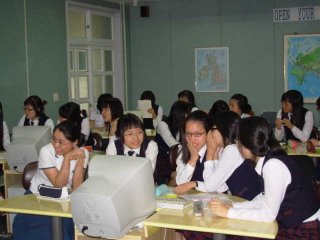
Here my students are playing a game called Telephone where you pass a phrase from person to person by whispering it. The last person must write the phrase correctly on the board; they are very competative and almost kill each other trying to get to the board first. As you can see from the pictures, some of the girls did not receive the memo about the switch from summer to fall uniforms.
href="http://photos1.blogger.com/blogger/5616/3369/1600/Korea.orientation%20255.1.jpg">
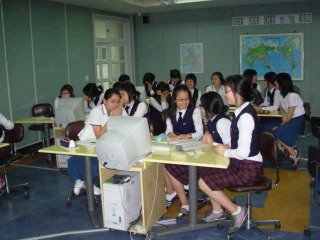
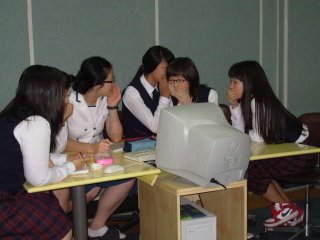
Sunday, September 17, 2006
Sometimes I feel as if I am the "pet foreigner" that my host sister begged her mom to let her have, and therefore is in charge of taking care of me. Maybe it is because my host sister is my translator or because of the fact that my host sister's homeroom teacher asked her if she would like to host me just a mere two days before I arrived, but on occasion I get this vision of my little sister coming home from school that day and pleading with her mother: "Please, please, Mom; can I keep her?" Regardless of how it came to be; I am now here, and my host mother has been more than gracious about inviting a foreigner into their small home for an entire year. This weekend we experienced the presence of a typhoon that made everything I did a damp experience. Aside from that fact, my weekend turned out to be very entertaining and insightful. Friday night I found myself at home, conference calling on Skype with 4 other Fulbright ETAs, all of whom are living on mainland Korea. Some might have called it a low point when we all realized that it was 11pm and this was a big Friday night for all of us, but it was nice to have their company, even if it was through such a vast medium (i.e. the computer.) Saturday I was invited to have lunch with a co-teacher from my school who happens to be yet another "Miss Kim" (I have met quite a few). On a side note, some people refuse to give me their full names, because they don't think I'll be able to understand or remember it. To this day I do not know my host mother's first name. When I arrived I kept saying to my younger sister: "What is your mom's name again?" My host sister would hesitate and say: "Ummm...you can just call her oma." (Oma is short for oamanni, which is the Korea word for mother.) So now, when I have a foreigner over to the house and introduce my mother, I must say: "And this is my mother." I guess we all must call her Oma, which feels very odd, considering the woman is only like 40 years old. Back to my weekend, Saturday I attended an "English Festival" which is a good example of something that was lost in translation, because leading up to this "English Festival" I had pictured sort of a fair with booths, games, and maybe costumes, but after attending the "English Festival" I would liken it more to an "English Production." This was the thirtieth anniversary of the University of Jeju English Department's existence, so it happened to be an extra special "English Festival." No one mentioned that to all of us foreigners who they invited to attend, so some of us showed up in ratty jeans and sweatshirts, rather than the formal attire that adorned most of the Koreans who were in attendance. Luckily my outfit fell somewhere in the middle. The current English students performed the musical The Sound of Music, which they had adapted into a sort of modern Korean version, meaning that at random moments the lights would go out and they would be dancing to Korean pop music beneath disco room lighting...very interesting, and funny. Afterwards we were shuffled upstairs for a very delicious sit down dinner, where people from around Jeju Island introduced themselves to us and were all very welcoming. Sunday morning the typhoon was still in full force, so I assumed that my lunch date with one of my co-teachers would be cancelled, but instead she called me and insisted on picking me up at my house. Something that I did not know before I got to Korea is that a typhoon means heavy, heavy rains, but the real reason the weather is so hard during a typhoon is that there are heavy winds that blow the heavy rains sideways into you, so you can't keep yourself dry under an umbrella. Anyways, we went and had an amazing tofu lunch at a restaurant in the country which is famous for it's tofu. This was by far the best tofu I have every had; they make it themselves and the process leaves a left over soy paste that is also delicious! My friend, Cheehee then took me to a photography gallery which used to be an old school house. The photgrapher, Kim Young Gap, died a year ago, but his work was amazing. He photographed the Odims (small mountains of Jeju Island) and the photos are indescribable. He could easily be compared to Ansel Adams. This old school house has been transformed into an Art gallery where his large panoramic photos are on display. Cheehee is trying to help the gallery get more money in order to expose his work to a more international audience. I don't think I mentioned that Cheehee is an incredible do-gooder, and therefore is always over-committed. She runs marathons, volunteers at the girls orphanage, and seems to work for almost any and every cause that is worth working for on Jeju Island. I can tell Cheehee and I will be great friends. So after the gallery, she had to drive to Seogwipo to meet with some of her old students to help them with their college applications, so I just rode with her (we were already halfway around the island) and took the bus from Seogwipo back to Jeju City. It was a really wonderful weekend. I feel like I'm getting to see so much in these first few weeks. One final note... this morning I attended the weekly Teacher's Meeting where the only things I understand are words like 5 o'clock, 9 o'clock, which seems to be useless information if you have nothing else to fill in the gaps with. Anyways, they passed out some sheets that were sort of like itineraries, and because I was sitting next to Cheehee this time, she translated. My name was on the sheet! I am in charge of supervising 4 other teachers and all the students who will be involved in the English play and the English Contest at our school's Winter Festival in December! Good thing she translated for me, or I may not have known to even show up...
Thursday, September 14, 2006
Natural English
I had a teacher ask me today if I would help her out by editing an English listening test that she was writing. In Korea, the kids are constantly getting tested, but it isn't just any test... they are being tested all over the country at the exact same time. When I say exact same time, I mean that the English listening test is broadcasted to ever classroom in every high school across the country at the exact same time. That's why my co-teacher will occasionally give me a schedule that does not even slightly resemble the schedule that I should have on a Wednesday or a Thursday or whatever, because the girls have a "test". He'll give me a schedule and say something to the effect of: so all your classes will start 15 minutes early and end 10 minutes late, but your fifth period will actually be sixth period and your third period will be twenty minutes late to class. And I of course nod my head, smile, and say, "Oh. O.K." So today, another English teacher revealed to me that she is writing one of these national tests, because the school board asked her to, and would I please help her with it. Of course I said yes, but I didn't realize it meant she would hand me a stack of forty pages worth of English dialogues that do not resemble the way "real" foreigners speak. It took me two hours to read through and correct the language to make it sound like a real conversation, which is what she was aiming at. Here is an example of a dialogue that was among the many which I had to edit:
John: Congratulations! I heard that you acquired the driver's license at last.
Amy: Thank you.
John: Amy! But why the long face?
Amy: Nothing. I'd rather not talk about it.
John: Come on, I think you need to let off some steam. And you shouldn't keep such
feelings to yourself.
Amy: All right. Yesterday I was driving my car to the school, and I saw a stopped tractor in the middle of the road.
John: In the middle of the road?
Amy: Yes. And I thought I should put on the brake immediately, but in panic I stepped on the accelerator instead.
John: Oh my god. Your car crashed against the tractor. Are you O.K?
Amy: I'm O.K. Fortunately, I managed to press the brake just before the crash, so my car slightly collided with the tractor. But I got a large dent in the front bumper.
John. It was lucky for you to be safe.
Amy: Yeah, I think so. I should be more careful.
One thing this dialogue could definitely use are a few more explanation marks! I was certainly amused to read what Koreans consider "natural English."
On another note, I will post some pictures from my classes soon; we played telephone, where the girls are broken up into three teams and have to whisper the phrases to the person next to them until it gets all the way down the line. Then the last person has to run up to the board and write it correctly. They were competing for stickers, and I really had to keep an eye on them... these girls are not messing around when it comes to competition; they don't have a problem cheating a little to get ahead. They were really cute though, especially in their fall uniforms (they just switched this week). The fall uniforms are made up of a pleated plaid skirt that hits mid-calf, a white button down, navy tie and navy vest. It was also kind of funny because about one in ten of the girls didn't realize that it was the day to switch their uniforms, so they are still wearing their summer ones. I will post pictures of them soon, but blogspot was giving me some problems when I was trying to do it earlier.
John: Congratulations! I heard that you acquired the driver's license at last.
Amy: Thank you.
John: Amy! But why the long face?
Amy: Nothing. I'd rather not talk about it.
John: Come on, I think you need to let off some steam. And you shouldn't keep such
feelings to yourself.
Amy: All right. Yesterday I was driving my car to the school, and I saw a stopped tractor in the middle of the road.
John: In the middle of the road?
Amy: Yes. And I thought I should put on the brake immediately, but in panic I stepped on the accelerator instead.
John: Oh my god. Your car crashed against the tractor. Are you O.K?
Amy: I'm O.K. Fortunately, I managed to press the brake just before the crash, so my car slightly collided with the tractor. But I got a large dent in the front bumper.
John. It was lucky for you to be safe.
Amy: Yeah, I think so. I should be more careful.
One thing this dialogue could definitely use are a few more explanation marks! I was certainly amused to read what Koreans consider "natural English."
On another note, I will post some pictures from my classes soon; we played telephone, where the girls are broken up into three teams and have to whisper the phrases to the person next to them until it gets all the way down the line. Then the last person has to run up to the board and write it correctly. They were competing for stickers, and I really had to keep an eye on them... these girls are not messing around when it comes to competition; they don't have a problem cheating a little to get ahead. They were really cute though, especially in their fall uniforms (they just switched this week). The fall uniforms are made up of a pleated plaid skirt that hits mid-calf, a white button down, navy tie and navy vest. It was also kind of funny because about one in ten of the girls didn't realize that it was the day to switch their uniforms, so they are still wearing their summer ones. I will post pictures of them soon, but blogspot was giving me some problems when I was trying to do it earlier.
Sunday, September 10, 2006
Hard Rocks and Harry Horses
Well, I ended up not going scuba diving this weekend, and it worked out to be a really good decision, because I was able to take an outing with my family. Friday night I met five other girls: Julienne, Lindsay, Emerald, Lauryn, and Katie for a beer. We went to a bar called KANSAS, where we indulged in french fries and beer; it was delicious. Saturday I met Kate and another friend Alex for lunch and then a movie at the DVD Bong. A DVD bong is a place where you can pick out a movie and then sit in a small room, on a comfy couch with air conditioning seeping out from above your head, and watch your movie projected on a screen that is about 4ft X 4ft.
We watched Narnia, which I hadn't seen and thought was wonderful...it brought back many images that have been stuck in my mind since I read the books when I was a little girl. Saturday night my family and I went to E.Mart, which is Korea's version of Wal.Mart. We had dinner at a food court on the top floor of E.Mart and then did some grocery shopping, clothes shopping. Sunday I went for a jog and then my family took me on an outing. First, went to the Jeju Rock Museum. I will never think of rocks in the same light, let me tell you. We saw rocks that looked like they had been molded from playdough; we saw rocks that cast shadows that looked like animals and big buddhas drinking tea. It was interesting to see how much Jeju Islanders connect their history with rocks, due to the fact that there are so many of these strangely shaped rocks, that formed from lava when they were ejected out of the big volcano during eruption 1.5 billion years ago. They labeled these rocks, and I still have no idea if the labels are at all scientific in nature, but my gut tells me that perhaps they aren't... one rock classification was the ribbon rocks, another the button rocks, and yet another (my personal favorite) were the cow dung rocks. After the rock museum, we headed to a sort of horse farm, I really cannot call it a ranch with a good conscience. (Actually, by the end of the experience I was likening it more to a Nazi prison camp for horses.) Of course, in the Korean tradition of doing things, we had to put our "horseback riding gear" on or else what's the point of doing it? So we put our boots, red vests, and Jeju style cowboy hats. Stood on a stack of three tires, to mount the horse. I immediately took the reins and was told that I was not supposed to do that, rather I should just clutch a metal handle that was sticking up from the saddle. My guide also shoved my boots back as far as he could into the stirrups so I'd be sure to get dragged good and far should I fall off the horse. They walked us about 10 feet and shoved the horses together for photos. It felt like a professional photo shoot as they told us where to place our hands and what poses to form. (Later we would return to the outfitting room, where roughly 80 pictures of families in the exact same poses and outfits hung from the wall.) Next, they led our horses around a short trail, about the size of going halfway around a city block. Then our guides whipped our horses on the butts and we trotted for 5 laps around a small ring (all of this without holding our reins.) The guide just stood at the gate of the arena, yelling stuff to the horses to keep them trotting. At one point I heard "Ilbon" which means Japan, and I thought he may be threatening to send them back there to be eaten.) I don't know what he was yelling, but it kept them moving until, at last, they parked us and we climbed back down onto the tires and then the ground. It was quite an experience! Next stop was this gigantic crater that was also formed when the volcano exploded, and it was a perfect evening to walk around. The air has really cooled off here, I think it was in the low 70's and not humid. There was an amazing view of Mt. Halla (the volcano); a great ending to a wonderful day! To prove what a wonderful day it had been, Eunnae, Sue Jeon and I all fell asleep in the back of the car on the way home.
We watched Narnia, which I hadn't seen and thought was wonderful...it brought back many images that have been stuck in my mind since I read the books when I was a little girl. Saturday night my family and I went to E.Mart, which is Korea's version of Wal.Mart. We had dinner at a food court on the top floor of E.Mart and then did some grocery shopping, clothes shopping. Sunday I went for a jog and then my family took me on an outing. First, went to the Jeju Rock Museum. I will never think of rocks in the same light, let me tell you. We saw rocks that looked like they had been molded from playdough; we saw rocks that cast shadows that looked like animals and big buddhas drinking tea. It was interesting to see how much Jeju Islanders connect their history with rocks, due to the fact that there are so many of these strangely shaped rocks, that formed from lava when they were ejected out of the big volcano during eruption 1.5 billion years ago. They labeled these rocks, and I still have no idea if the labels are at all scientific in nature, but my gut tells me that perhaps they aren't... one rock classification was the ribbon rocks, another the button rocks, and yet another (my personal favorite) were the cow dung rocks. After the rock museum, we headed to a sort of horse farm, I really cannot call it a ranch with a good conscience. (Actually, by the end of the experience I was likening it more to a Nazi prison camp for horses.) Of course, in the Korean tradition of doing things, we had to put our "horseback riding gear" on or else what's the point of doing it? So we put our boots, red vests, and Jeju style cowboy hats. Stood on a stack of three tires, to mount the horse. I immediately took the reins and was told that I was not supposed to do that, rather I should just clutch a metal handle that was sticking up from the saddle. My guide also shoved my boots back as far as he could into the stirrups so I'd be sure to get dragged good and far should I fall off the horse. They walked us about 10 feet and shoved the horses together for photos. It felt like a professional photo shoot as they told us where to place our hands and what poses to form. (Later we would return to the outfitting room, where roughly 80 pictures of families in the exact same poses and outfits hung from the wall.) Next, they led our horses around a short trail, about the size of going halfway around a city block. Then our guides whipped our horses on the butts and we trotted for 5 laps around a small ring (all of this without holding our reins.) The guide just stood at the gate of the arena, yelling stuff to the horses to keep them trotting. At one point I heard "Ilbon" which means Japan, and I thought he may be threatening to send them back there to be eaten.) I don't know what he was yelling, but it kept them moving until, at last, they parked us and we climbed back down onto the tires and then the ground. It was quite an experience! Next stop was this gigantic crater that was also formed when the volcano exploded, and it was a perfect evening to walk around. The air has really cooled off here, I think it was in the low 70's and not humid. There was an amazing view of Mt. Halla (the volcano); a great ending to a wonderful day! To prove what a wonderful day it had been, Eunnae, Sue Jeon and I all fell asleep in the back of the car on the way home.
Photos of my weekend 9/10/06
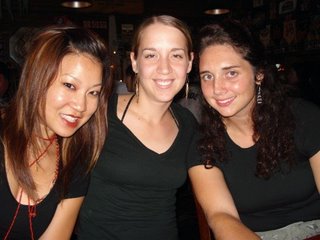
Julienne, Lindsay and I; out on the town...
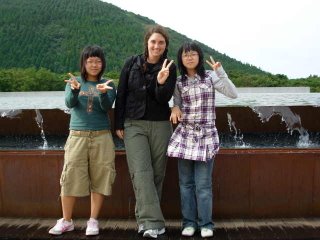
Me and my host sisters in front of a water fountain at the Jeju Rock Museum.
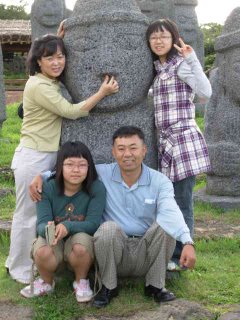
My host family, all of whom acted as my tour guides this weekend!
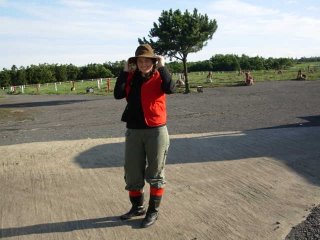
Here I am in what Koreans consider "proper horseback riding attire"...
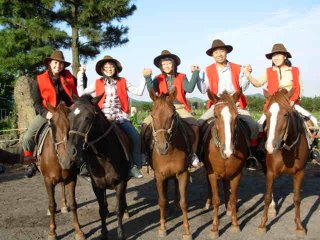
My family and I, getting ready to be led around a trail the size of a football field.
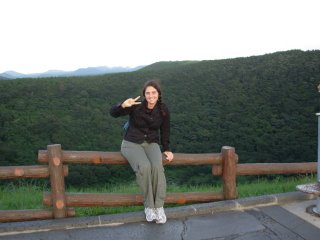
Here I am at one of the famous craters on Jeju Island, which was formed when the volcano erupted many years ago.
Saturday, September 02, 2006
O.K., I feel very bad for neglecting my blog in the past week. I cannot honestly claim that I was even that busy, but I have been trying to adjust to life here and relaxing, reading, etc. So, it is Friday now, and I am making my weekend plans. I am scuba diving on Sunday, my first day working towards getting my Advanced Dive certification. That means that I will do a total of 6 dives. Of those 6 dives, one dive must be a deep dive (100 feet deep) and another must be a night dive. These are what we might call "Adventure dives". Anyways, I am very excited to go back down, because it truly is an amazing feeling, and I have seen some really beautiful fish. Two weekends ago when I went I saw an octopus! That may not be that amazing, but I eat a lot of octopus here too, so that might have added to the delight of seeing one. Last weekend was nice, on Saturday, I met up with some ETAs and Eunnae, my host sister, met us and we all went to dinner. I heard one of the funnier awkward moment stories that I have heard since getting here, and I thought I should share it. My friend Alex, who teaches at an all girls high school similar to the one I teach at (advanced level students, etc.) recently got a new principal at his school. (teachers and principals rotate in Korea; the maximum a teacher or principal can stay at a school is 4 years, then they must go to a new school which is assigned by the school board.) Since we have all been taught that first impressions are highly valued in Korea, we are all painfully aware of the mistakes that we make on first meetings, but this one would be funny in any culture. On the new principal's first day, Alex rode his bike to school as he always does and brought his nice clothes to school so he could change into them after he cooled down. Since Alex has his own office away from the rest of the teachers, he just changes his clothes right there. So on this particular morning when Alex was pulling his pants off his second leg, the door opened and for his first meeting with his new principal, he was wearing no more than his underwear. Awkward to say the least, but also very funny, so we could only assure Alex that the principal was probably telling the same amusing story to a big group of teachers, and they were probably laughing as hard as we were about the encounter. Then Sunday, I went out to eat with a young teacher named Cheehee who is very friendly and sweet. She took me to a great Korean restaurant where we ate a dish that is well-known here on Jeju: A stuffed, boiled chicken in broth that is stuffed with rice. It was absolutely delicious, and as my friend Cheehee says; it is very good for you.
Subscribe to:
Posts (Atom)